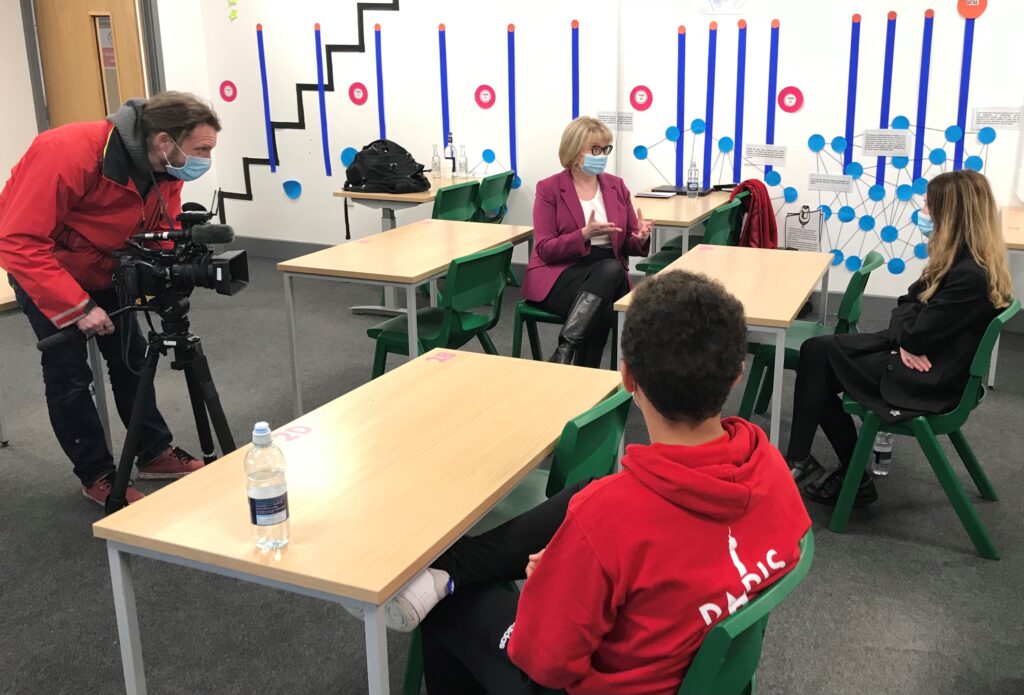The BBC cameras have visited Great Academy Ashton
BBC Education Editor Branwen Jeffreys was welcomed into the Ashton under Lyne campuson Thursday, November 25, during filming for a national news and radio piece regarding Education Secretary Gavin Williamson’s announcement that students will receive grades awarded and determined by teachers, with pupils only assessed on what they have been taught.
The BBC team took a tour of the school, talked to a range of students, including Year 8 and Year 10s to gain an insight onto what it’s been like studying at home. Branwen then sat down with current Year 11 student Elisabeth Salumu, Eliot Warburton and Principal David Waugh to record their instant reactions on the government’s statement.
David said “ It’s brilliant news that we are now in a position to welcome back to face to face teaching our 1275 young people. The last 12-months have been a challenge for everyone and our students have continued to engage fully remotely. Over the next 2-weeks we will be welcoming back all students, supporting the delivery of over 4500 lateral flow tests and the delivery of our ambitious GAA Engage Curriculum. As Principal of Great Academy Ashton, I am genuinely blessed to have a highly dedicated, skilled and professional staff team. The challenge set down by government to re-open fully is readily accepted and we look forward to re-engage all students in face to face learning. After chatting with the team, the BBC were massively impressed with our students and our preparation for ensuring students and staff have a safe return”.
Fairness and flexibility are at the heart of the Government’s plans to ensure young people get to their next stage of education or training.Teachers will be able to draw on a range of evidence when determining grades, including the optional use of questions provided by exam boards, as well as mock exams, coursework, or other work completed as part of a pupil’s course, such as essays or in-class tests. No algorithm will be used.
Teachers will submit grades to exam boards by 18 June, allowing as much teaching time as possible before teachers make their assessments.
Results days for GCSE, A level and some vocational qualifications will take place in the week of 9 August – moved forward from the week of the 23 August. These earlier dates provide additional time for appeals to be completed, so students reliant on those outcomes to achieve their university offer have the best chance of accessing a place.
Year 11 student, Elizabeth Salumu said “Teacher assessed grades are a lot better for me because I tend to feel the pressure with exams, so whilst I’m comfortable in my lessons, this is a lot better for me”.
Eliott Warburton also supported the announcement “I’m perfectly fine with it because I’m comfortable with my teachers, I know them well, and I know that the work I have done in my lessons should get me a good grade”.
To support teachers in making their judgements, exam boards will provide detailed guidance before the end of the spring term.
The proposals being taken forward were supported in responses to the department and Ofqual’s largest ever consultation, with over 100,000 responses of which just over half (52%) came from pupils. Ofqual’s Interim Chief Regulator Simon Lebus said: “We know how difficult this past year has been for many students, parents, schools and colleges. In normal years, we rely on exams to support students’ progression. This year it is teachers’ judgement that will be used to assess what has been learned and determine student grades. Assessment cannot itself serve as an instrument to recover lost learning and compensate for the different experience’s students will have had in different parts of the country, and the arrangements being put in place will therefore only consider what students have been taught, not what they have missed. The aim is to make it no harder overall for this year’s students to receive a particular grade than students in other years. I am confident that these arrangements will allow all parts of the education and training sector to work together collectively to make sure students’ grades reflect what they have achieved and provide a sound basis to enable them to make good decisions about their future”.
